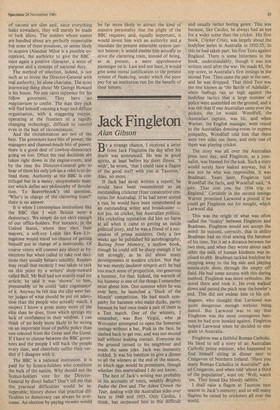Jack Fingleton
Alan Gibson
By a strange chance, I received a letter from Jack Fingleton the day after his death was announced. He was in good spirits, at least before his short illness. 'I wish', he wrote, 'that I could raise a flagon of the good stuff with you at Taunton.' Alas, no more.
If Jack had never written a report, he would have been remembered as an outstanding cricketer (four consecutive centuries for Australia). If he had never scored a run, he would have been remembered as an outstanding writer and broadcaster — not jusi. on cricket, but Australian politics. His cricketing reputation did him no harm at all when it came to getting an inside political story, and he was a friend of a succession of prime ministers. Only a few weeks ago he published his autobiography, Batting from Memory, a mellow book, though he could still be sharp enough if he felt strongly, as he did about many developments in modern cricket. Not that he was merely laudator tempris acti: he had too much sense of proportion, too generous a humour, for that. Indeed, the warmth of his humour is one of the things I remember most about him. One summer when he was over here, he launched a 'Duck of the Month' competition. He had much sympathy for batsmen who make ducks, partly because he had once made a pair of them in a Test match. One of the winners, I remember, was Roy Virgin, who at Worcester attempted to open the Somerset innings without a bat. Pink in the face, he dashed back to get one, and was out second ball without making contact. Everyone on the ground turned to his neighbour and made the same joke. Jack was immensly tickled. It was his mention to give a dinner to all the winners at the end of the season, in which eggs would be prominent, though whether this materialised I do not know.
The best of Jack's writing was probably in his accounts of tours, notably Brightly Fades the Don and The Ashes Crown the Year, dealing with the Australian sides over here in 1948 and 1953. Only Cardus, I think, has surpassed him in this difficult and usually rather boring genre. This was because, like Cardus, he always had an eye for a wider scene than the cricket. His first book, Cricket Crisis, was largely about the bodyline series in Australia in 1932-33. In this he had taken part, his first Tests against England. There is some bitterness in the book, understandably, though it was not written until after the war. He made 83, the top score, in Australia's first innings in the second Test. Then came the pair in the next, and he was dropped. That third Test was the one known as 'the Battle of Adelaide', when feelings ran so high against the bodyline tactics that a large number of police were assembled on the ground, and it was felt that if one Australian came over the pickets, the lot would. Woodfull, the Australian captain, was hit, and when Warner, the English manager, went round to the Australian dressing-room to express sympathy, Woodfull told him that there were two sides out there, and only one of them was playing cricket.
The story was all over the Australian press next day, and Fingleton, as a journalist, was blamed for the leak. Such a story would surely have leaked anyway, but it was not he who was responsible. It was Bradman. Years later, Fingleton told Woodfull the facts, and Woodfull said, 'A pity. That cost you the 1934 trip to England.' Certainly in the second innings Warner promised Larwood a pound if he could get Fingleton out for nought, which Larwood did.
This was the origin of what was often called the 'rivalry' between Fingleton and Bradman. Fingleton would not accept the word: he insisted, correctly, that in ability Bradman had no rival among the batsmen of his time. Yet it set a distance between the two men, and when they wrote about each other the milk of human kindness was inclined to ebb. Bradman tackled bodyline by stepping away to the leg side and playing tennis-style shots through the empty off field. He had some success with this daring method. Fingleton was more orthodox. He stood there and took it. He even walked down and patted the pitch near the bowler's end. This did not endear him to his colleagues, who thought that Larwood was quite dangerous enough without being baited. But Larwood was to say that Fingleton was the most courageous batsman he had ever bowled against. Fingleton helped Larwood when he decided to emigrate to Australia.
Fingleton was a faithful Roman Catholic. He liked to tell a story of an Australian Catholic prime minister, who happened to find himself sitting at dinner next to Craigavon of Northern Ireland. 'Have you many Roman Catholics in Australia?' asked Craigavon, and when told 'about a third of the population', went on: 'Well, watch 'em. They breed like bloody rabbits.'
I shall raise a flagon at Taunton next season to Jack's memory; and so will many flagons be raised by cricketers all over the world.














































 Previous page
Previous page